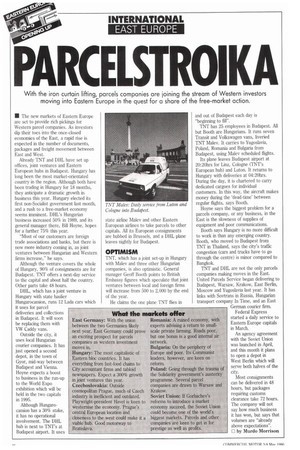PARCEISTROIKA
Page 48

If you've noticed an error in this article please click here to report it so we can fix it.
With the iron curtain lifting, parcels companies are joining the stream of Western investors moving into Eastern Europe in the quest for a share of the free-market action.
• The new markets of Eastern Europe are set to provide rich pickings for Western parcel companies. As investors dip their toes into the once-closed economies of the East, a rapid rise is expected in the number of documents, packages and freight movement between East and West.
Already TNT and DHL have set up offices, joint ventures and Eastern European hubs in Budapest. Hungary has long been the most market-orientated country in the region. Although both have been trading in Hungary for 18 months, they anticipate a dramatic growth in business this year. Hungary elected its first non-Socialist government last month, and a rush to a free-market economy seems imminent. DHL's Hungarian business increased 50% in 1989, and its general manager there, Bill Hoyne, hopes for a further 75% this year.
"Most of our customers are foreign trade associations and banks, but there is now more industry coming in, as joint ventures between Hungarian and Western firms increase," he says.
Although the venture covers the whole of Hungary, 90% of consignments are for Budapest. TNT offers a next-day service to the capital and about half the country. Other parts take 48 hours.
Outside the city, it uses local Hungarian courier companies. It has just opened a second depot, in the town of Gyor, mid-way between Budapest and Vienna. Hoyne expects a boost to business in the run-up to the World Expo exhibition which will be held in the two capitals in 1995.
Although Hungarocarnion has a 30% stake, it has no operational involvement. The DHL hub is next to TNT's at Budapest airport. It uses state airline Maley and other Eastern European airlines to take parcels to other capitals. All its European consignments are hubbed in Brussels, and a DHL plane leaves nightly for Budapest.
OPTIMISM
TNT, which has a joint set-up in Hungary with Maley and three other Hungarian companies, is also optimistic. General manager Geoff Booth points to British Embassy figures which speculate that joint ventures between local and foreign firms will increase from 500 to 2,000 by the end of the year.
He claims the one plane TNT flies in and out of Budapest each day is "beginning to fill".
TNT has 25 employees in Budapest. All but Booth are Hungarians. It runs seven Transit and Volkswagen vans, liveried TNT Maley. It carries to Yugoslavia, Poland, Romania and Bulgaria from Budapest, using Maley scheduled flights.
Its plane leaves Budapest airport at 20:20hrs for Linz, Cologne (TNT's European hub) and Luton. It returns to Hungary with deliveries at 04:20hrs. During the day, it is chartered to carry dedicated cargoes for individual customers. In this way, the aircraft makes money during the 'dead-time' between regular flights, says Booth, Hoyne says the biggest problem for a parcels company, or any business, in the East is the slowness of supplies of equipment and poor communications.
Booth says Hungary is no more difficult to work in than any emerging country. Booth, who moved to Budapest from TNT in Thailand, says the city's traffic congestion (cars and trucks have to go through the centre) is minor compared to Bangkok.
TNT and DHL are not the only parcels companies making moves in the East. United Parcels Service began delivering to Budapest, Warsaw, Krakow, East Berlin, Moscow and Yugoslavia last year. It has links with Sovtrans in Russia, Hungarian transport company In Time, and an East German courier firm.
Federal Express started a daily service to Eastern Europe capitals in March.
An agency agreement with the Soviet Union was launched in April, and this month it plans to open a depot in West Berlin which will serve both halves of the city.
Most consignments can be delivered in 48 hours, but packages requiring customs clearance take 72 hours. The company will not say how much business it has won, but says that volumes are "already above expectations".
by Murdo Morrison








































































































































































